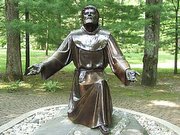Brad
 “What is a weed? Only a flower whose potential has not yet been recognised.” I found that quotation on the front of a card. A weed is a flower whose potential has not been recognised.
“What is a weed? Only a flower whose potential has not yet been recognised.” I found that quotation on the front of a card. A weed is a flower whose potential has not been recognised.
A baby is born. Its parents discover that instead of the healthy child they had been expecting, their lovely baby has a disability that can never be cured. How do they react?
I remember the morning a young woman came to me, weeping, with her newborn in her arms. It had something wrong with its knee because it wasn’t quite straight. She thought her baby would be crippled for life. On this occasion the baby’s apparent disability could be easily corrected. I bandaged its knee tightly and instructed the mother not to remove the bandage until the following day. Next morning, the baby’s knee was straight. This young mother’s baby was more than ever a beautiful flower in her eyes.
There was another time when I found a mother crying over her new baby. He was profoundly disabled with something that could not be cured. She wished he had never been born. She could see nothing beautiful in her infant and I knew that when she returned to her village, this baby would not survive. It was tragic. She saw, not a flower, but a weed.
Yet I remember a boy whose disability was far greater than that baby’s. When I knew Brad he was 10 years old but he could only function as if he were a few months old. His mother had to do everything for him. It was pathetic to look at him, to see him lying on the floor, day after day, doing nothing for himself. When he was born the doctor suggested that Brad be left behind in hospital because he would probably not live for any longer than a few weeks. He actually lived for 14 years because of the care he received from his family. The baby that should have died was the longest-living child on record with his condition. The only things Brad ever learned to do were to smile and to laugh.
Many people, looking at Brad would not have seen a flower. They would have seen a weed that needed to be uprooted. His family saw a flower. Even though Brad probably didn’t understand his younger brother and sisters, they never did anything without coming to tell him. When they returned from school, the other children came to tell Brad about their day. He would laugh and then the children would run off to play. Although he couldn’t play, Michele, Stephen and Katie involved Brad in most of their games. They would often play indoors just to give him company. Brad would watch them and laugh.
Everybody in the town knew Brad. They would visit his parents and sit watching the helpless little boy and enjoying his laugh. He nearly died on so many occasions. There was one evening when Brad was terribly ill. His mother told him that although she loved him so much, if he wanted to die and go to Jesus, she would let him go. She wouldn’t hold on to him, however much she loved him and would miss him. On that occasion, Brad did not laugh. A single tear ran down his cheek. Brad had somehow understood his mother.
When Brad died, a couple of years later, the whole town came to the funeral. His broken little body had given laughter. He had somehow managed to make people feel loved. The little boy who had so little potential had enriched everyone who came to know him.
Lord, we pray for the children whose disability leads to their rejection. We pray that they will find love. We also pray for those who are like Brad, whose lives are a beautiful flower, a sign of your great love working through the weakest and most helpless. Thank you, Lord, for the flowers with which you fill our lives. There are no weeds, Lord, you created flowers. We are the ones who were so blind that we called your flowers weeds.

